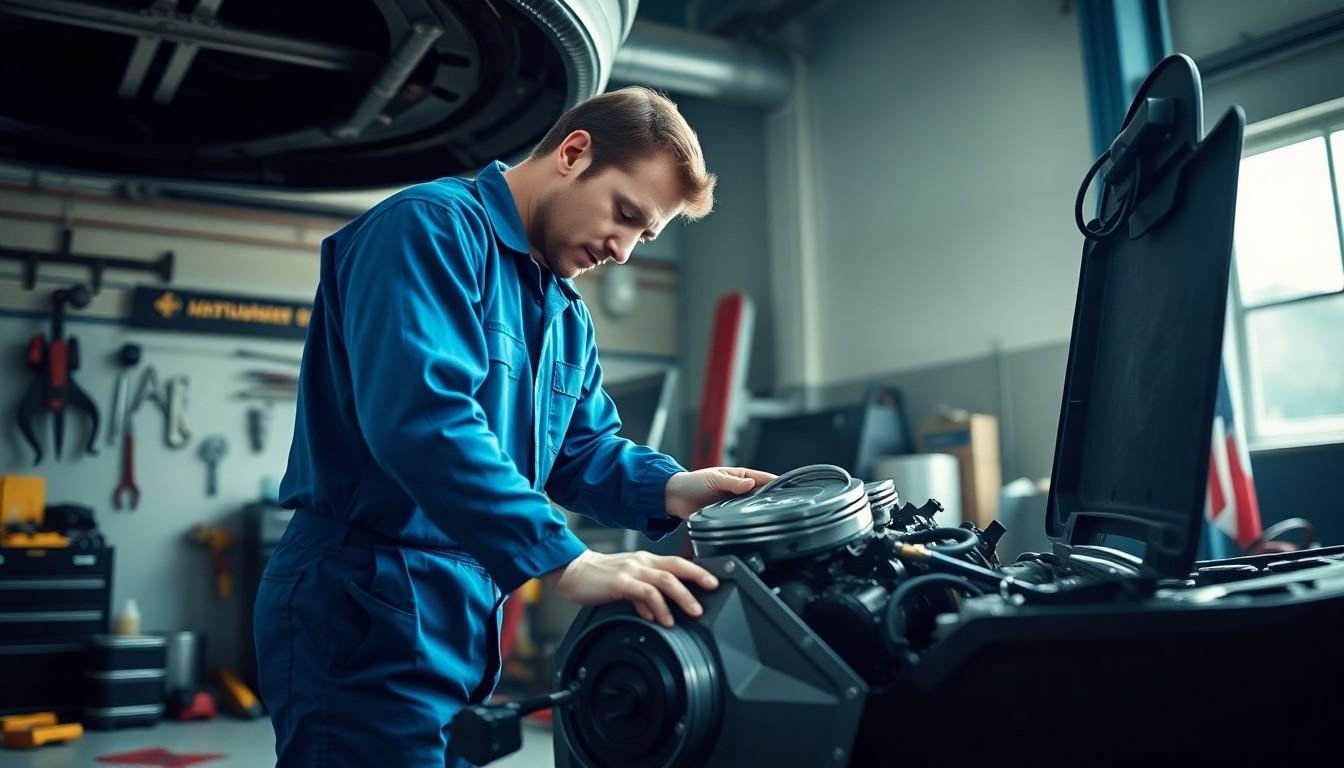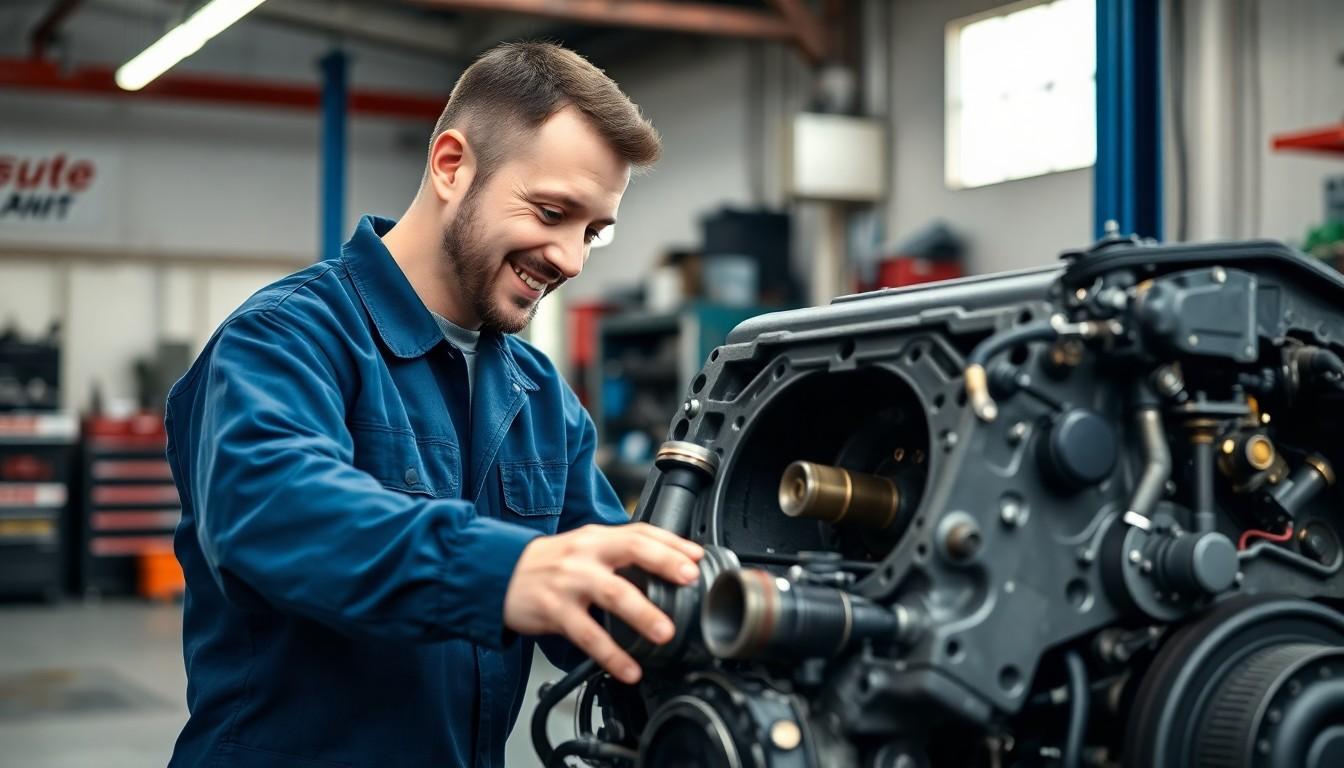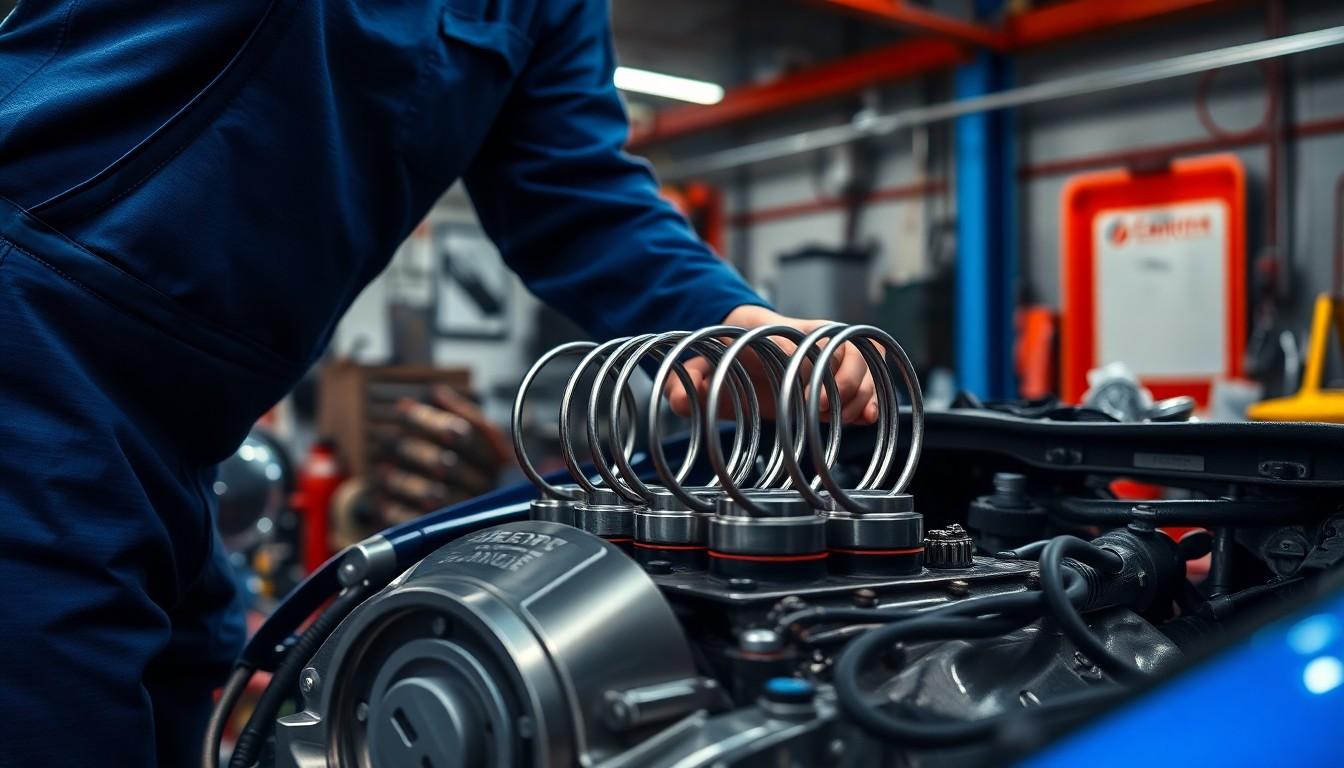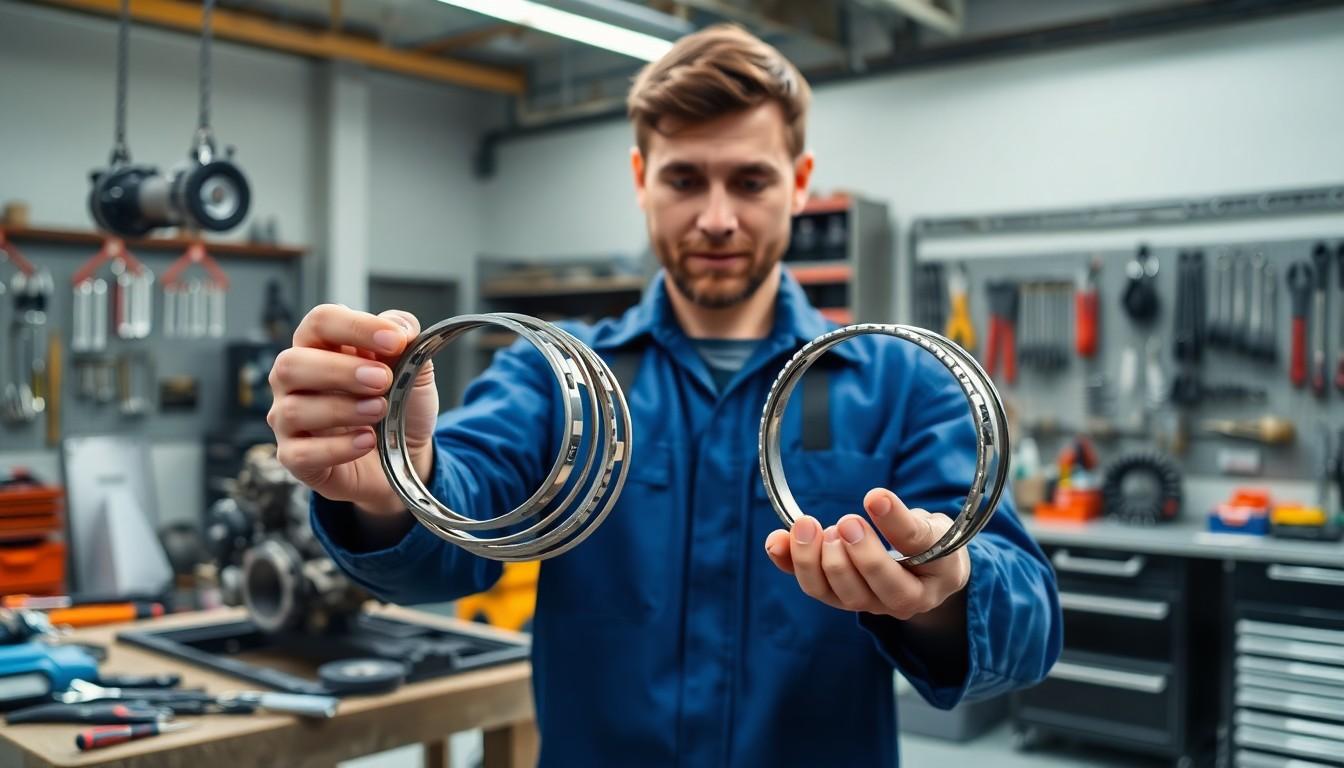When engine performance starts to falter, the question of piston ring replacement often arises. These tiny components play a crucial role in maintaining compression and preventing oil consumption—yet many car owners wonder if the investment is worthwhile compared to more extensive repairs or even engine replacement.
We’ve helped countless vehicle owners navigate this exact dilemma. The truth is that piston ring replacement can be a cost-effective solution that extends your engine’s life significantly when done at the right time. But, several factors influence whether it’s the best choice for your exact situation, including your vehicle’s age, overall condition, and the extent of engine damage.
Understanding Piston Rings and Their Function
Piston rings form a critical component within your vehicle’s engine, creating a seal between the piston and cylinder wall. These small but vital parts perform several essential functions that directly impact your engine’s performance, efficiency, and longevity.
How Piston Rings Work in Your Engine
Piston rings create an airtight seal that maintains compression and prevents combustion gases from escaping into the crankcase. Most engines use three rings per piston: the top compression ring seals combustion pressure, the second compression ring provides additional sealing, and the oil control ring regulates oil consumption. These rings experience constant friction against cylinder walls while enduring extreme temperature variations from 75°F to over 500°F during normal operation. Even though their small size, piston rings transfer approximately 70% of combustion heat from pistons to the cooling system, making them crucial for thermal management within the engine.
Signs of Failing Piston Rings
Poor engine performance often signals piston ring issues, with excessive oil consumption being the most common indicator. Vehicles typically consuming more than one quart of oil per 1,000 miles might have worn rings allowing oil to enter combustion chambers. Blue-gray exhaust smoke particularly after startup or during acceleration reveals oil burning in the combustion chamber due to compromised rings. Compression loss manifests as reduced power, difficult starting, and rough idling since failing rings can’t properly seal combustion pressure. Engine misfires occur more frequently with bad piston rings as the inconsistent compression affects combustion timing and efficiency. Increased blowby pushes exhaust gases into the crankcase, sometimes forcing oil through breathers and creating visible external oil leaks around valve covers and gaskets.
The Cost of Replacing Piston Rings

Replacing piston rings represents a important investment in your vehicle’s engine health. Understanding the total expense involves examining both parts and labor costs, which can vary considerably depending on your exact vehicle and engine type.
Parts Cost Breakdown
Piston ring sets are relatively affordable compared to the overall repair cost. Individual rings typically cost between $20 and $150 each, with the price varying based on your engine specifications and quality of components. For multi-cylinder engines, expect to pay between $40 and $200 total for a complete set of piston rings. Premium performance rings or specialized materials may cost more, but often provide enhanced durability and improved sealing capabilities.
Labor Expenses and Time Investment
Labor constitutes the majority of the expense when replacing piston rings. Professional mechanics charge between $200 and $500 on average for standard vehicles, though costs can escalate to $4,000 or more for complex engines or high-end automobiles. This substantial price reflects the extensive disassembly required to access the piston rings.
Time requirements explain these high labor costs. Technicians typically spend 10-16 hours completing a piston ring replacement job, as the process involves removing the engine, disassembling it to access the pistons, carefully replacing the rings, and then reassembling everything correctly. Luxury vehicles and certain engine designs require additional specialized procedures that extend the work time.
The total expense for piston ring replacement generally falls between $1,800 and $3,500, encompassing both parts and labor. High-performance or luxury vehicles often land at the upper end of this range or beyond. Many shops also recommend additional repairs once they’ve opened the engine, potentially increasing your final invoice.
When Piston Ring Replacement Makes Financial Sense

Investing in piston ring replacement makes financial sense in exact scenarios where the benefits outweigh the costs. The decision depends on various factors including vehicle age, engine condition, and long-term ownership plans.
Vehicle Age and Value Considerations
Newer vehicles with important market value benefit most from piston ring replacement. Cars under 10 years old or with less than 100,000 miles typically justify the $1,050 to $4,200 repair investment, as this maintains their resale value and extends their service life. High-performance or luxury vehicles like Mercedes Benz and BMW particularly benefit from quality replacement parts due to their advanced engine materials and performance standards. Older vehicles require more careful evaluation, especially when their market value approaches the repair cost, making the investment potentially impractical in vehicles with multiple mechanical issues or extensive wear.
Engine Performance Factors
Engine performance improves dramatically with properly functioning piston rings. Replacing worn rings restores lost compression, improving power output, acceleration response, and fuel efficiency by creating proper seals between pistons and cylinder walls. Oil consumption drops significantly after replacement, preventing the environmental impact and expense of constantly adding oil. Early intervention also prevents more catastrophic engine damage that could result from continued operation with failing rings, saving owners from potential engine replacement costs ranging from $2,000 to $13,000. The reduction in engine noise, elimination of blue-gray exhaust smoke, and decreased risk of overheating further justify the investment for engines that are otherwise mechanically sound.
Alternatives to Piston Ring Replacement

When faced with piston ring issues, several alternative approaches exist beyond simple ring replacement. Each option presents different cost implications, labor requirements, and long-term benefits for your vehicle’s performance and reliability.
Engine Rebuilding vs. Ring Replacement
Engine rebuilding represents a more comprehensive approach than isolated piston ring replacement. This process addresses multiple engine components simultaneously, potentially fixing other worn parts that might cause problems later. During a rebuild, technicians typically replace all piston rings along with other critical components like bearings and gaskets. The average cost for piston ring replacement alone runs around £877.06, making rebuilding more expensive upfront but potentially more economical long-term. Rebuilding introduces additional opportunities for technical errors due to its complexity but provides a more thorough solution when multiple engine components show signs of wear.
Replacing just the piston rings may prove insufficient if your pistons or cylinder walls have important damage. Engine experts often recommend replacing pistons alongside rings to ensure optimal performance and prevent accelerated wear on cylinder bores. This combination approach strikes a balance between isolated ring replacement and complete engine rebuilding, addressing the most critical components while managing costs.
Complete Engine Replacement
Installing an entirely new engine eliminates the need for extensive disassembly and repair work associated with piston ring replacement. This option proves particularly valuable for vehicles with engines showing multiple failure points or extensive internal damage. Complete replacement reduces the risk of ongoing issues with other engine components that might be nearing the end of their service life.
Engine replacement typically costs more than rebuilding or ring replacement but delivers a factory-fresh power plant with renewed reliability. For older vehicles that have accumulated over 150,000 miles, replacement often makes more financial sense than investing in partial repairs. The decision between replacement versus rebuilding largely depends on your vehicle’s age, overall condition, and whether other engine components like cylinder walls show important wear beyond what new piston rings alone could remedy.
DIY vs. Professional Piston Ring Replacement

Piston ring replacement represents one of the most complex engine repair procedures, requiring both extensive mechanical knowledge and specialized tools. The decision between DIY and professional replacement hinges on your experience level, available time, and comfort with engine disassembly.
Professional Replacement
Professional piston ring replacement offers expertise and reliability but comes with important labor costs. Mechanics typically charge between $1,800 and $3,500 for this service, depending on your vehicle’s model and engine type. The high cost reflects the labor-intensive nature of the job, which can take up to 10 hours to complete. Certified mechanics bring years of experience to the task, reducing the risk of errors that could cause additional engine damage. They also provide warranties on their work, giving you peace of mind that the repair will be performed correctly.
DIY Replacement
DIY piston ring replacement can save substantial labor costs but introduces considerable risk for inexperienced mechanics. The process requires complete engine disassembly, precise measurements, and careful reassembly—tasks that demand advanced mechanical skills. Many car enthusiasts underestimate the complexity involved, leading to expensive mistakes. Engine disassembly exposes many components to potential damage, and improper installation of rings can cause immediate engine failure. Taking on this project without proper preparation often leads to greater expenses than professional service would have cost.
Tools and Skills Required
Successful DIY piston ring replacement requires an extensive set of specialized tools and advanced mechanical knowledge. Essential tools include an engine hoist, piston ring compressor, torque wrench, micrometer, and cylinder hone. The mechanical skills needed cover understanding engine timing, torque specifications, clearance measurements, and proper sealing techniques. Experience with complete engine teardown and reassembly proves invaluable, as does the ability to identify worn or damaged components during inspection. The time commitment can span several days, even for experienced DIY mechanics, requiring a clean, well-organized workspace throughout the entire process.
Potential Pitfalls of DIY Installation
DIY piston ring replacement contains many pitfalls that can transform a repair project into a costly mistake. Human error represents the greatest risk, with improper installation leading to immediate engine damage upon startup. The complexity of engine disassembly increases the likelihood of damaging critical components like crankshafts, camshafts, or cylinder walls. Inadequate sealing from incorrectly installed rings perpetuates issues like oil consumption and performance problems, negating the repair’s purpose. Many DIYers also overlook the importance of properly preparing cylinder walls before installing new rings, leading to premature ring failure. These potential complications make professional installation the safer choice for most vehicle owners, even though the higher upfront cost.
Long-Term Benefits of New Piston Rings

Replacing piston rings delivers substantial long-term advantages that extend far beyond the initial investment. These benefits include reduced maintenance costs, improved operational efficiency, and decreased engine downtime.
Reduced Maintenance Costs
New piston rings significantly lower ongoing maintenance expenses by minimizing oil consumption. Worn rings allow oil to seep into combustion chambers, resulting in increased oil usage and higher operating costs over time. Fresh piston rings create proper seals that keep oil where it belongs, eliminating excessive consumption and reducing your regular maintenance budget.
Engine efficiency improves dramatically with new rings, as they reduce friction and drag—two major factors that impede performance and increase fuel consumption. This enhanced efficiency translates directly to lower operating costs and better fuel economy throughout the life of your engine.
Addressing piston ring issues early prevents costly secondary problems that often develop when rings fail. Early replacement rescues valuable engine components from unnecessary wear and helps avoid the cascading effect of engine damage that typically follows ring failure.
Improved Compression and Performance
Functional piston rings ensure optimal compression within engine cylinders, which directly impacts performance. When compression improves, engines respond with better acceleration and smoother operation. New rings restore the proper sealing that’s essential for maintaining consistent compression ratios across all cylinders.
Engine misfires decrease dramatically after ring replacement, creating more consistent power delivery and smoother operation. The improved seal from new rings prevents compression gases from escaping during the combustion process, ensuring each cylinder contributes its full power potential.
Enhanced power output results from efficient piston rings that maintain proper compression and reduce internal engine temperature. Racing applications have demonstrated that modern, thinner piston rings can improve horsepower while simultaneously extending engine life, offering the best of both performance and longevity.
Extended Engine Lifespan
New piston rings prevent severe engine damage that commonly occurs when worn rings continue operation. Excessive heat, increased friction, and oil contamination in combustion chambers can eventually destroy engines when failing rings aren’t addressed promptly. Replacement eliminates these destructive forces, extending your engine’s operational life significantly.
Engine durability increases substantially with properly functioning rings, as they maintain the critical barrier between combustion gases and the crankcase. Advanced technology in modern piston rings has shown remarkable improvements in engine longevity, with some specialized rings tripling the life expectancy of short blocks in high-performance applications.
Operating temperatures remain more consistent and controlled with functional piston rings, preventing the overheating that accelerates wear on critical engine components. This temperature regulation protects everything from bearings to valves, ensuring all parts of the engine experience less stress and longer service life.
Conclusion
Replacing piston rings is a important decision that depends on your vehicle’s condition age and value. While the investment ranges from $1800 to $3500 it can save you from more expensive engine replacement costs down the road.
For newer vehicles under 10 years old with good market value the performance benefits often justify the expense. These include restored compression improved fuel efficiency and reduced oil consumption.
Though DIY replacement might seem appealing professional installation typically provides better results and peace of mind. The long-term benefits of properly functioning piston rings extend beyond immediate performance gains to include extended engine life and lower maintenance costs.
Eventually the decision comes down to weighing repair costs against your vehicle’s remaining service life and value to you.
Frequently Asked Questions
What are the main functions of piston rings in an engine?
Piston rings create a seal between the piston and cylinder wall, maintaining compression and preventing combustion gases from escaping. They also regulate oil consumption by scraping excess oil from cylinder walls. Most engines use three rings per piston: the top compression ring seals combustion gases, the second compression ring provides additional sealing, and the oil control ring manages oil distribution.
How can I tell if my piston rings are failing?
Look for these key signs: excessive oil consumption (needing to add oil frequently), blue-gray exhaust smoke (especially during acceleration), decreased engine compression, engine misfires or rough running, and increased blowby (gases escaping into the crankcase). If you notice multiple symptoms, have your vehicle professionally inspected as soon as possible.
How much does piston ring replacement typically cost?
The total cost generally ranges from $1,800 to $3,500. Piston ring sets themselves are relatively affordable ($40-$200), but labor makes up the bulk of the expense. Labor costs average $200-$500 for standard vehicles but can exceed $4,000 for complex engines. The replacement process requires 10-16 hours of work since the engine must be extensively disassembled.
When does replacing piston rings make financial sense?
Piston ring replacement makes sense for newer vehicles (under 10 years old or less than 100,000 miles) with significant market value. It’s particularly worthwhile for high-performance or luxury vehicles that benefit from quality replacement parts. For older vehicles, carefully compare the repair cost against the vehicle’s market value before proceeding.
What performance benefits come from replacing worn piston rings?
Benefits include restored engine compression, improved power output, better fuel efficiency, and reduced oil consumption. You’ll also experience less engine noise, elimination of blue-gray exhaust smoke, and decreased risk of overheating. New rings prevent more severe engine damage that could lead to costly engine replacement ($2,000-$13,000).
What alternatives exist to just replacing piston rings?
The main alternatives are engine rebuilding and complete engine replacement. Engine rebuilding addresses multiple components simultaneously, potentially fixing other worn parts while replacing all piston rings. Complete engine replacement offers a fresh start for vehicles with extensive internal damage and might be preferable for older, high-mileage vehicles.
Can I replace piston rings myself or should I hire a professional?
While DIY replacement can save on labor costs, it requires extensive mechanical knowledge, specialized tools, and significant time investment. Most vehicle owners should choose professional installation to avoid errors that could cause further engine damage. Professionals offer expertise and reliability that significantly reduce risks associated with this complex repair.
What long-term benefits come from replacing piston rings?
Long-term benefits include reduced maintenance costs (less oil consumption), improved operational efficiency (better fuel economy), and extended engine lifespan. New rings prevent costly secondary problems and ensure optimal compression, leading to improved performance. They also help maintain consistent operating temperatures, protecting critical components and enhancing overall durability.

